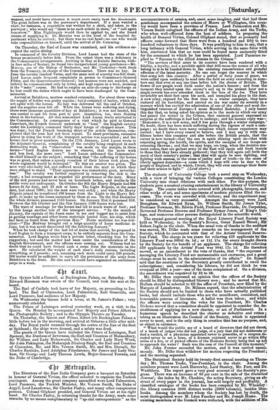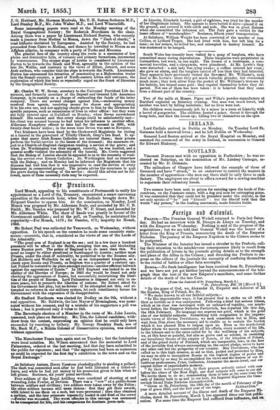311ttrup1tp.
The Directors of the East India Company gave a banquet on Saturday in honour of General Vivian, the officer selected to organize the Turkish contingent. Among the great company assembled were Lord Palmerston, Lord Panmure, the Turkish Minister, Mr. Vernon Smith, the Duke of Argyll, Lord Lansdowne, Sir Charles Pesky, and many other conspicuous persons. Colonel Oliphant presided, and General Vivian sat at his right hand. Sir Charles Pasley, in returning thanks for the Army, made some remarks by no means complimentary to "spLcial correspondents" as the aucompaniments of armies, and, amid douse laughter, said that had these gentlemen accompanied the armies of Moore or Wellington, this can't- try would have been a province of France. Lord Palmerston and Mr. Vernon Smith eulogized the officers of the Indian Army, and the Turks, who when well-officered form the best of soldiers. In proposing the health of General Vivian, Colonel Oliphant stated, that so promptly had officers come forward that there were from a hundred and fifty to two hundred volunteers in three days. It was gratifying to him to say, that a long intimacy with General Vivian, while serving in the same force with him, convinced him that no man could be found more eminently fitted for the command to which he has been appointed. Lord Panmure re- plied to " Success to the Allied Armies in the Crimea."
" The services of that army to its country have been rendered with a fidelity, a loyalty, and a patriotic spirit that will cause the names of all who belong to it to he banded down to the unfading remembrance and grateftil affection of the latest posterity. No one can forget the manner in which that army left this country. After a period of forty years of peace, we were called upon suddenly to send into the field an army exceeding in num- bers any that ever at any one time before left the shores of Britain. The flower of our people went forth under the nation's banner ; and from the moment they landed upon the enemy's soil up to the present hour not a single reverse has ever attended them in the face of the foe. They have invariably set their feet upon his neck, and trampled his glory in the dust. A new army, exposed for the first time to a winter campaign, they have endured all its hardships, and carried on the war under its severity in a manner which has excited the admiration of one of the oldest and most dis- tinguished veterans of Europe—I mean Marshal Radetzky. I only learnt this day that, on being asked his opinion as to the mode in which our army had passed the winter in the Crimea, that eminent general expressed no surprise at the sufferings it had had to undergo; and his laconic reply was- ' Remember, it is a new army, and it has gone through a winter campaign.' No doubt, there has been much suffering during the rigours of such a cam- paign ; no doubt there were many omissions which future experience may correct : but I have every reason to believe, and I may say it with con- fidence before this company and also before the British people, that the corner is now turned—that the sun is again shining upon us—that with returning spring, the health, the spirits, and the energies of our troops are returning likewise ; and that we may hope, ere long, when the decisive mo- ment comes, that our gallant army in the East will again add fresh laurels to those that they have already gathered ; that they will again call forth the meed of their country's praise ; that they will again be seen fighting, and fighting with success, in the cause of justice and of truth—in the cause of liberty against despotism—a cause which I hope will ever be dear to the people of England, and in which, I trust, they will ever encourage their fleets and their armies to fight." (Loud cheers.) The students of University College took a novel step on Wednesday, with a view of bringing the various Colleges constituting the London University into closer relations with each other. For this purpose, the students gave a musical evening entertainment in the library of University College. The centre tables were covered with photographs, bronzes and other works of art, and some specimens of modern pictures filled the re- ceases. The room was crowded with visitors; and the experiment may be considered as very successfuL Amongst the company were Lord Brougham, Sir Edward Ryan, Dr. William Smith, Sir James Tyler, Professor Newman, Mr. Edwin Field, Professor Heaviside, Dr. Carpenter, Reverend Professor Browne and Professor Rymer Jones, of King's Col. lege and numerous other persons distinguished in the scientific world. .
The annual general meeting of the Royal Literary Fund Society was; held on Wednesday, in the Society's Rooms, Great Russell Street ; Sir Robert Inglis in the chair. When the usual vote of thanks to the auditorii was moved, Mr. Dilke made scene remarks on the management of the Society, whieh he contrasted with that of the Artists' General Benevo- lent Fund. The charge in ten years for relieving 429 applicants by the Literary Fund was 5094/. Os. ld.; or 114 17s. for every draught drawn by the Society for the benefit of an applicant. The charge for relieving 659 applicants by the Artists' Fund was 9041. 17s. DI. He therefore moved, as an amendment to the vote of thanks, that "the expenses of managing the Literary Fund are unreasonable and enormous, and a great change must be made in the administration of its affairs." Dr. Russell said that the exertions of the Secretary greatly contributed to swell the subscriptions ; and, considering his labours, he did not think he was overpaid at 2001. a year—one of the items complained of. On a division, the amendment was negatived by 32 to 28.
Mr. Dilke then expressed an opinion that the offices of the Society should be filled by distinguished literary men ; and he moved that Mr. Hallam should be selected to fill the office.of President, now filled by the Marquis of Lansdowne. Dr. Milman argued, that the administration of the Society should not be limited to those who have actually published books, but should include those who are the munificent, consistent, and honourable patrons of literature. A ballot was then taken; and while the officers were counting the votes for the President, Mr. Charles Dickens moved that a committee should be appointed to consider the de- sirableness of applying for a new charter, or act of Parliament. In a humorous speech he described the charter as defective and rotten ; taking as an illustration the Council of the Society, which is appointed never to meet, and is the only thing in creation that has no purpose, end, or object in existence.
" What would the public say of a board of directors that did not direct, of a bench of judges who did not judge, of a jury that did not deliberate or find a verdict, of a physician appointed never to prescribe, of a surgeon die rected never to set a bone, of a fireman enjoined never to go within fifty miles of a fire, or of picked officers of the Humane Society being tied up not to approach the water ? Such was the case of the Council at this moment."
Mr. John Forster seconded the motion, and it was carried unanie mouldy. Mr. Dilke then withdrew his motion respecting the President ; and the meeting separated.
The Statistical Society held its twenty-first annual meeting on Thurse day ; Mr. Thomas Tooke, Vice-President, in the chair. Among the members present were Lord Harrowby, Lord Stanley, Mr. Farr, and Dr. Waddilove. The report gave a very good account of the Society's pro- gress. There was an increase of 65 per cent in the sale of the Statistical Journal; the index by Mr. Cheshire' the acting Secretary, giving an ab- stract of every paper in the journal, has sold largely and profitably. A classified catalogue of the books has been compiled by Mr. Wheatley the library contains 2000 distinct works (2600 volumes), besides blue- books. Among the members whom the Society has lost by death, the most distinguished were M. Leon Faucher and Mr. Joseph Hume. The existing members of the Council were redlected, with the addition of Ma J.- G. Hubbard, Mr. Herman Merivale, Mr. T. H. Sutton Sotheron M.P., Lord Stanley M.P., Mr. John Walter M.P., and Lord Wharncliffe.
Some interesting papers were read at the Monday meeting of the Royal Geographical Society; Sir Roderick Murchison in the chair. Among them was a. paper by Lieutenant Richard Burton, who recently made a journey from Medina to Mecca, down the " Darb el slaarki," a road hitherto unvisited by Europeans. Assisted by the Society, he bad proceeded from Cairo to Medina, and thence he travelled to Mecca as an Afghan pilgrim, in company with a party of Turks and Meccana
The general face of the country along the route is a succession of low plains and diminutive hills, of volcanic and primary formations, intersected by watercourses. The steeper slope of Arabia is considered by Lieutenant Burton to be towards the South and West, agreeably to the opinion of the late Dr. Wallin, and contrary to the views of Ritter, Jomard, and some Arab authors, who consider that the slope is towards the North. Lieutenant Burton has announced his intention of penetrating as a Mahomedan trader into the Somali country, a part of North-eastern Africa still unknown, the exploration of which has been so repeatedly urged on the Court of Directors by the Geographical Society.
Mr. Charles W. W. Bevan, secretary to the Universal Provident Life As- surance, and formerly secretary, of the Deposit and General Life Assurance Company, is in custody on a charge of embezzling the funds of the latter company. There are several charges against him,—embezzling money received from agents, receiving money for shares and appropriating it to his own use, and not applying cheeks given to him by the Directors for specific purposes, such as reassurance of lives in other offices : but they were not fully entered upon at Guildhall on Monday, when Bevan surrendered himself. His counsel said that every charge could be satisfactorily met— his client was accused because he had taken his influence to another office. Alderman Humphery offered to take bail for the accused in 5001., with twenty-four hours' notice; in the mean time Bevan was sent to Newgate.
Two Irishmen have been fined by the Clerkenwell Magistrate for rioting at a funeral in the graveyard of Trinity Church, Gray's Inn Road. It ap- pears that many Irish Roman Catholics are interred there ; their priests perform the burial-service in the house of the deceased ; the mounters ob- ject to a Church-of-England clergyman reading a service at the grave; and when Dr. Worthington was thus engaged, recently, he was hustled, and a general seethe violated the solemnity of the funeral. Mr. Come suggested that the Bishop of London should be appealed to as to the necessity of read- ing the service over Roman Catholics ; Dr. Worthington had an interview with the Bishop ; and on Monday last he informed the Magistrate that his diocesan had told him that it was imperative to read the service at every Interment in consecrated ground. The priests advise the mourners to quit the grave during the reading of the service : should this advice not be fol- lowed, more of these unseemly riots may be expected.



























 Previous page
Previous page